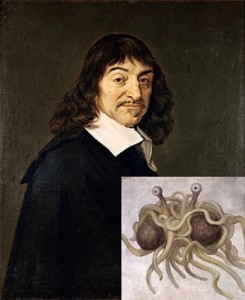 The, “Flying Spaghetti Monster” was created by an atheist in 2005 to protest the Kansas State Board of Education’s decision to allow for the teaching of Intelligent Design. Since then, the appeal to the entity as part of atheistic rhetoric has become increasingly popular. Essentially, beliefs affirming the existence of God are mocked by saying that the belief in a flying spaghetti monster is just as valid. But is it?
The, “Flying Spaghetti Monster” was created by an atheist in 2005 to protest the Kansas State Board of Education’s decision to allow for the teaching of Intelligent Design. Since then, the appeal to the entity as part of atheistic rhetoric has become increasingly popular. Essentially, beliefs affirming the existence of God are mocked by saying that the belief in a flying spaghetti monster is just as valid. But is it?
Comparing the belief in God to the belief in a fictional or unknown being is nothing new. Indeed, the exercise has long been practiced by theists themselves in order to be certain that the concept of, “God” did not originate from within. René Descartes in particular deals extensively with this issue. In his First Meditation Descartes explains:
…when painters wish to represent sirens and satyrs by means of especially bizarre forms, they surely cannot assign to them utterly new natures. Rather, they simply fuse together the members of various animals. Or if perhaps they concoct something so utterly novel that nothing like it has ever been seen before (and thus is something utterly fictitious and false), yet certainly at the very least the colors from which they fashion it out to be true…It is from these components, as if from true colors, that all those images of things that are in our thought are fashioned, be they true or false.[1]
Fictional creatures such as the siren and satyr are simply the fusion of ideas that he who imagined them already had. Even the most extraordinary of fictional creatures are ultimately composed of simple elements (e.g. colors) already existing as ideas. For what man can even conceive of a color he has never previously seen? The Flying Spaghetti Monster is simply another example of what Descartes is addressing here. When one attempts to conceive of the Flying Spaghetti Monster he is able to do so by positing human qualities combined with noodles and meat. Then there is not much left to do but imagine this fellow hovering or flying around. This is the act of attuning those things the mind is already aware of. No truly novel idea is at play here. Just how then is the idea of God any different? Descartes in his Third Meditation:
Unquestionably, those ideas that display substances to me are something more and, if I may say so, contain within themselves more objective reality than those which represent only modes or accidents. Again, the idea that enables me to understand a supreme deity, eternal, infinite, omniscient, omnipotent, and creator of all things other than himself, clearly has more objective reality within it than do those ideas through which finite substances are displayed.[2]
Descartes understands that the idea of God has the highest level of reality. The reason for this is that the effect gets its reality from its cause.[3] The ideas of the eternal, infinite, omniscient and omnipotent cannot be mere attunements of other ideas. These ideas cannot be fully experienced or cobbled together by anyone other than he who possesses them. Therefore, a being that possesses such attributes (God) is not the product of attunement. Rather, He is the ultimate source which allows for lesser ideas. Therefore, the idea of God must come from outside of man’s own imagination. As a result, comparing a product of attunement (e.g. the Flying Spaghetti Monster) to the source of ideas (God) is invalid.
Taking Descartes’ argument aside, one has to wonder if atheists who use the Flying Spaghetti Monster as a counter-argument against theistic claims genuinely believe they have a solid point. It should be apparent that comparing a flying noodly character to the creator of the universe and source cause is antithetical to the rational mind. The comparison of God to the Flying Spaghetti Monster just goes to prove what the Bible says about atheists is true; they are fools (Ps. 14:1).
Note: This article could only briefly consider Descartes’ highly detailed and thorough arguments. The study of Descartes’ Meditations, Objections, and Replies is encouraged.

Leave a Reply